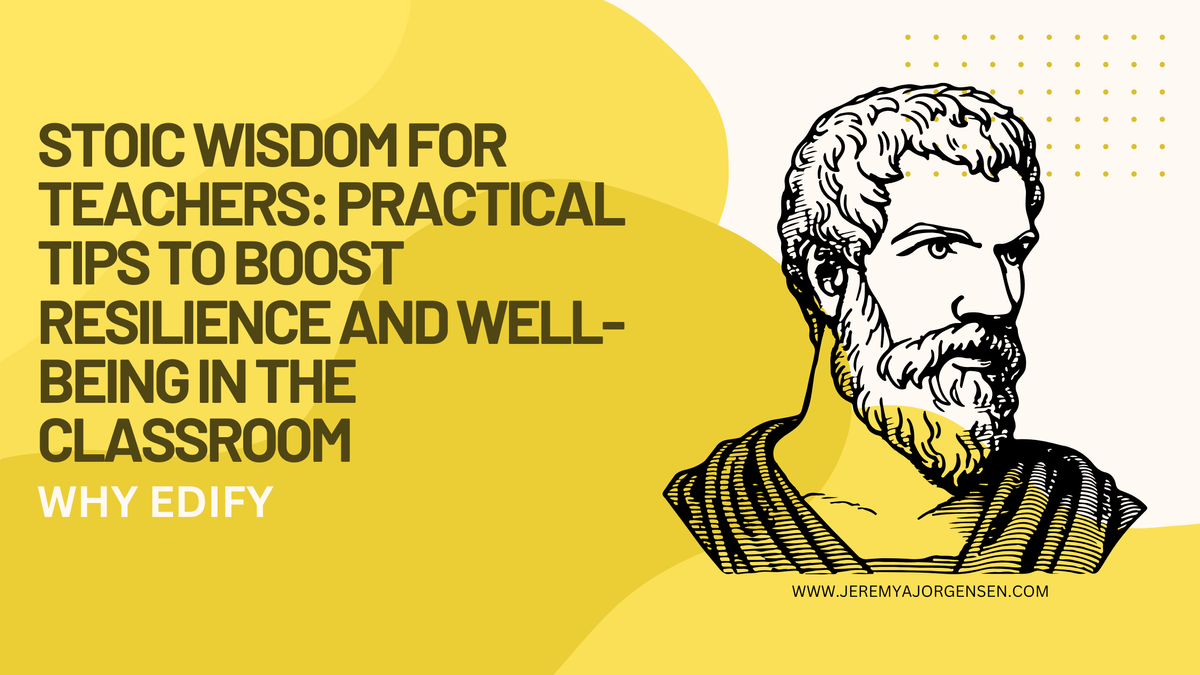Stoic Wisdom for Teachers: Practical Tips to Boost Resilience and Well-being in the Classroom
Discover how Stoic principles can transform your teaching experience. Learn practical strategies to enhance resilience, manage stress, and cultivate well-being in the classroom. Explore ancient wisdom for modern educators.

As an Amazon Associate, I earn from qualifying purchases. All affiliate links are marked with an asterisk (*). This helps support the newsletter. Thank You! Read more here.

Teaching is a noble profession with unique challenges. By applying Stoic principles, educators can enhance their resilience and well-being. Before diving into practical applications, let's explore the history of Stoicism and its modern-day practitioners.
A Brief History of Stoicism
Stoicism, founded in Athens by Zeno of Citium in the early 3rd century BCE, is a school of Hellenistic philosophy that emphasizes ethics, logic, and the natural world. The philosophy teaches the development of self-control and fortitude as a means of overcoming destructive emotions. It doesn't seek to eliminate emotions but to transform them through reason.
Key figures in the development of Stoicism include:
- Seneca the Younger (4 BCE - 65 CE): A Roman statesman and philosopher who wrote extensively on Stoic ethics.
- Epictetus (50 - 135 CE): A Greek philosopher and former slave who founded his own school of philosophy in Nicopolis.
- Marcus Aurelius (121 - 180 CE): Roman Emperor and philosopher known for his personal writings in "Meditations."
Stoic Practitioners
Here are some other notable Stoics:
- Tim Ferriss: Author and podcaster who frequently discusses Stoic practices for productivity and mental resilience.
- Ryan Holiday: Author of several books on Stoicism, including "The Obstacle Is the Way" and "The Daily Stoic."
- James Stockdale: Former United States Navy vice admiral who credited Stoicism with helping him survive as a prisoner of war in Vietnam.
- Massimo Pigliucci: Professor of Philosophy at City College of New York who writes and speaks about modern applications of Stoicism.
- George Washington: The first President of the United States was known to have been influenced by Stoic philosophy, particularly in his leadership style and personal conduct.
- Frederick the Great: The King of Prussia in the 18th century studied Stoic philosophy and incorporated its principles into his rule and personal life.
- Cato the Younger: A Roman statesman and philosopher renowned for his moral integrity and adherence to Stoic principles in his personal and political life.
The Four Virtues of Stoicism
The Stoics identified four virtues that form the foundation of their philosophy. These virtues guide individuals toward living fulfilling and virtuous lives.
1. Wisdom
Wisdom in Stoicism refers to navigating complex situations with sound judgment and discernment. It involves:
- Practical knowledge: Understanding how to act in various situations
- Good judgment: Making decisions based on reason rather than emotion
- Perspective: Seeing the bigger picture and long-term consequences
Benefits: Cultivating wisdom helps teachers make better decisions in the classroom, adapt to changing circumstances, and provide valuable guidance to students. It allows for more effective problem-solving and conflict resolution. You can cultivate wisdom by reflecting on experiences through journaling or meditation, seeking feedback from colleagues and mentors, engaging in continuous learning through professional development, practicing mindfulness to enhance awareness and decision-making, and studying diverse perspectives and philosophies in education.
2. Justice
Justice in Stoic philosophy encompasses fairness, integrity, and moral righteousness. It involves:
- Fairness: Treating others equitably and without bias
- Integrity: Acting in accordance with one's principles
- Social responsibility: Contributing positively to society
Benefits: Practicing justice fosters a positive classroom environment, builds trust with students and colleagues, and sets a strong ethical example. It helps create a sense of community and mutual respect within the educational setting. Teachers can practice justice by treating all students equally regardless of background or ability, implementing fair and consistent disciplinary systems, acknowledging and addressing unconscious biases, and ensuring equal opportunities for participation and success.
3. Courage
Courage in Stoicism is not just physical bravery but also moral fortitude. It involves:
- Facing challenges: Confronting difficulties with resilience
- Standing up for beliefs: Defending one's principles, even when unpopular
- Self-control: Mastering one's fears and impulses
Benefits: Courage enables teachers to take risks in their teaching methods, advocate for their students, and face the daily challenges of the profession with resilience. It promotes personal growth and inspires students to be brave in their own pursuits. You can practice courage by trying new, innovative teaching methods, speaking up in meetings to advocate for students' needs, addressing difficult behaviors head-on, seeking and being open to feedback, and admitting mistakes to students to demonstrate learning from them. When you publicly build your courage, you also serve as a role model for your students.
4. Temperance
Temperance refers to self-control, moderation, and restraint. It involves:
- Self-discipline: Controlling one's desires and impulses
- Moderation: Avoiding extremes in behavior and thought
- Mindfulness: Being aware of one's actions and their consequences
Benefits: Practicing temperance (moderation) helps teachers maintain a healthy work-life balance, manage stress effectively, and model emotional regulation for their students. It promotes sustainable teaching practices and prevents burnout. Teachers can practice moderation by setting clear boundaries between work and personal time, prioritizing tasks and learning to say "no" to non-essential commitments, taking regular breaks during the workday to recharge, practicing mindfulness techniques to manage stress, limiting after-hours work and email checking, and engaging in self-care activities outside of work.
By focusing on these four virtues, teachers can enhance their professional practice, personal well-being, and positive impact on students. The virtues work synergistically, reinforcing each other to create an ethical framework for navigating the challenges of teaching and life.
The Stoic Principle of Focusing on What You Can Control
A fundamental principle in Stoic philosophy focuses on what is within our control and accepting what is not. This concept, often attributed to Epictetus, helps maintain peace of mind and effectiveness in your actions.
Key Aspects of This Principle:
- Dichotomy of Control: Epictetus divided everything into two categories - those within our control and those outside our control. He argued that peace of mind comes from recognizing this difference between the two and acting accordingly.
- Internal vs. External: We have control over our thoughts, judgments, attitudes, and actions. External events, others' opinions, and outcomes are often beyond our control.
- Redirecting Energy: By focusing on what we can control, we direct our energy and efforts more productively rather than wasting them on futile attempts to change the unchangeable.
- Emotional Resilience: This principle helps in developing emotional resilience. By not attaching our happiness to external events, we can maintain composure in the face of challenges.
Applying This Principle in Teaching:
For educators, this principle can be particularly powerful:
- Classroom Management: Focus on creating a positive learning environment and your teaching methods rather than worrying about factors outside the classroom.
- Student Outcomes: While you can't control a student's home life or innate abilities, you can control the quality of your instruction and the support you offer.
- Professional Development: Concentrate on improving your skills and knowledge rather than fretting over educational policies you can't change.
“You become what you give your attention to.” - Epictetus
Practical Ways to Incorporate Stoic Wisdom into Your Teaching Life
- Focus on What You Can Control: Many factors are beyond your influence in the classroom. Concentrate on your lesson preparation, classroom management, and personal growth. Let go of worries about district policies or student home situations that you can't change. As Epictetus said, "The chief task in life is simply this: to identify and separate matters so that I can say clearly to myself which are externals not under my control, and which have to do with the choices I actually control."
- Practice the Four Virtues: Embody courage by trying new teaching methods, temperance by maintaining work-life balance, justice by treating all students fairly, and wisdom by continually learning and improving your craft. Marcus Aurelius emphasized these virtues, stating, "Waste no more time arguing about what a good man should be. Be one."
- Cultivate Mindfulness: Remember, "We become what we give our attention to." Start each day by setting positive intentions for your classes. During breaks, take a few deep breaths to center yourself. This practice aligns with Seneca's advice: "The mind that is anxious about future events is miserable."
- Embrace Journaling: Keep a teaching journal to reflect on your experiences, problem-solve challenges, and track your professional growth. Spend 10 minutes at the end of each week writing about your successes and areas for improvement. This practice mirrors Marcus Aurelius's "Meditations," which were personal writings never intended for publication.
- Apply Temperance: Find balance in your work. Avoid the extremes of overworking or underperforming. Set realistic grading schedules and stick to them. Learn to say no to extra commitments that might lead to burnout. Seneca advised, "Set aside a certain number of days, during which you shall be content with the scantiest and cheapest fare, with coarse and rough dress, saying to yourself the while: 'Is this the condition that I feared?'"
- Practice Resilience: When faced with difficult situations, ask yourself, "How can I respond virtuously?" This pause can help you react more calmly and effectively to classroom disruptions or challenging interactions with colleagues or parents. As Epictetus taught, "It's not what happens to you, but how you react to it that matters."
Implementing these Stoic-inspired practices can enhance your ability to handle teaching stresses, leading to greater job satisfaction and personal well-being.
Stoicism Books and Resources
- The Obstacle is the Way (*ad)
- The Beginner's Guide to Stoicism: Tools for Emotional Resilience and Positivity (*ad)
- Teach Like a Stoic
❤ Enjoy this Article?
🍵 Show Your Support and 🤗 Share It




